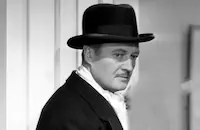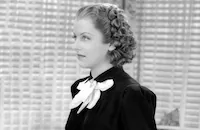Let's Fall in Love
Brief Synopsis
Cast & Crew
David Burton
Edmund Lowe
Ann Sothern
Miriam Jordan
Gregory Ratoff
Greta Meyer
Film Details
Technical Specs

Synopsis
On a sound stage at Premier Pictures in Hollywood, successful film director Ken Lane is preparing to shoot the next scene of his new production, a five-year-old pet project set in Sweden. Tempestuous star Hedwig Forsell, whom Ken discovered, becomes irritated with her maid for a small oversight, then stalks off the set after claiming that the script is "bunk" and vowing to return home. Despite producer Max Hooper's efforts to defuse the situation, Ken refuses to play "wet nurse to a flat-footed Swede." When Max suggests replacing Hedwig with an American, Ken insists that his film needs a Swedish actress who can sing well. The New York office pressures Max to shut down the production, but Ken keeps hoping to discover his elusive star. When Ken and his fiancée, Gerry Marsh, visit a circus, Ken is taken with the beautiful Jean Kendall, a sideshow concession worker with a fake French accent. Although she does not initially believe Ken's promise to make her a movie actress, he convinces her to give it a try. Ken places Jean in the home of Lisa and Svente Bjorkman, from whom she learns the customs and language of Sweden. Ken is able to stall Max's cancellation of the project for another five weeks, and after Jean successfully passes herself off to a group of Lisa's friends, Ken believes that she is ready for Max. Jean, who has fallen in love with Ken, is disappointed to learn that he is engaged. Consoled by Lisa, Jean nonetheless hopes that one day Ken will love her. Ken tells Max about Jean, whom he has renamed Sigrid Lund, and convinces him that she is reluctant to become an actress. Max invites Jean to lunch and believes, after much effort, that he has convinced her to sign a seven-year contract with his studio. After Jean performs a love scene with Ken as a screen test, Gerry views the developed footage and becomes convinced that Jean, whom she recognizes from the circus, is too realistic in her performance. As the publicity for the new star fills headlines across the country, Max invites the press and representatives of the film industry to meet Jean at his home in Santa Monica. As Sigrid begins to sing at the party, the drunken and jealous Gerry exposes the scam and walks out on Ken. Max, infuriated with Ken for not telling him of his decision to cast an American instead of a Swede, lashes out at the director, who resigns the next morning. After Jean disappears, the public swamps theater owners with letters demanding that her film be released. Max, realizing that it was a mistake to lose the star and her director, offers to renegotiate with Ken, who will return to the studio only if Jean is found. Learning from Lisa that Jean has returned to the circus, Ken trails her to Kansas City, where the reunited couple declare their love.

Director
David Burton
Cast

Edmund Lowe

Ann Sothern

Miriam Jordan

Gregory Ratoff
Greta Meyer

Betty Furness
Arthur Jarrett
Anderson Lawler
Tala Birell
Ruth Warren

Marjorie Gateson

John Qualen
Niles Welch
Kane Richmond
Ethel Clayton
Lorin Raker
Selmer Jackson
Charles Giblyn
Michael Visaroff
Edwin Stanley
Consuelo Baker
Sven Hugo Borg
Crew

Film Details
Technical Specs

Articles
Let's Fall in Love
In Let's Fall in Love, Sothern plays a Brooklyn girl plucked out of a carnival to replace a temperamental Swedish movie star who has just stormed off a film, leaving the director (Edmund Lowe) and producer (Gregory Ratoff) in panic mode. Ratoff insists on finding a genuine Swedish singer to replace the star, and when Lowe can't find one, he takes Sothern out of the carnival, spends six weeks training her, and then -- voila -- presents her as a major new discovery. The ploy works until Sothern falls for her handsome director, whose jealous fiancée gets wind of what's going on and spills the beans.
Let's Fall in Love may be a trifle, but it was received as a very good trifle. The New York Times described it as "a nimble-witted romantic comedy which trips along so lightly that the fade-out brings the spectator abruptly out of a mood... [Sothern] reveals personal charm and a pretty voice." Variety not only praised the film but was impressed with it as a smartly produced investment: "On the trade end it really amounts to a lesson on how to make a picture with tunes and keep it within financial reason. Some of the indie producers will probably sit through this one a couple of times. They should."
As good an impression as Sothern makes, it's Gregory Ratoff who steals the film as the harried movie producer, the type of character he did best. He is the source of much of the film's comedy and was singled out by many critics. (The Times called the film "Mr. Ratoff's show.")
This was composer Harold Arlen's first movie songwriting assignment. He wrote a few songs with lyricist Ted Koehler for the picture, but only two remained in the final cut: "Let's Fall in Love" and "Love Is Love Anywhere." Many reviews of the time complained that the title tune was reprised too often, but the song did become very popular and remains a standard.
In a 1987 interview, Sothern recalled her transformation from Harriet Lake into Ann Sothern. Harry Cohn had discovered her on stage and made her a film offer, but he insisted she change her name because in his view there were already too many actors with the last name of "Lake," including Arthur Lake and Alice Lake. "He made out a list and called me in," Sothern recalled. "On the list there were a lot of names. Having been a good student of Shakespeare and that sort of thing, E.H. Sothern's name was there. I admired him because he was a very fine Shakespearean actor, so I took Sothern. My mother's name was Annette, so I took Ann. And that's how I became Ann Sothern."
Let's Fall in Love was remade in 1949 as Slightly French, directed by Douglas Sirk.
Producer: Harry Cohn
Director: David Burton
Screenplay: Herbert Fields (story and screenplay)
Cinematography: Benjamin Kline
Film Editing: Gene Milford
Cast: Edmund Lowe (Ken Lane), Ann Sothern (Jean Kendall), Miriam Jordan (Gerry Marsh), Gregory Ratoff (Max Hopper), Greta Meyer (Lisa Bjorkman), Betty Furness (Linda), Arthur Jarrett (Art Jarrett, Composer), Anderson Lawler (Allen Foster), Tala Birell (Hedwig Forsell), Ruth Warren (Nellie), Marjorie Gateson (Agatha Holmes).
BW-68m.
by Jeremy Arnold
Sources:
James Robert Parish and Gregory W. Mank, Hollywood on Hollywood
Margie Schultz, Ann Sothern: A Bio-Bibliography

Let's Fall in Love
TCM Remembers - Ann Sothern
TCM Remembers - Ann Sothern
Quotes
Trivia
Notes
Although contemporary reviews list only two songs, "Let's Fall in Love" and "Love Is Love Anywhere," modern sources list two additional songs, "Breakfast Ball" and "This is Only the Beginning," which were not included in the final print. The story was remade by Columbia in 1949 under the title Slightly French, directed by Douglas Sirk and starring Dorothy Lamour.














